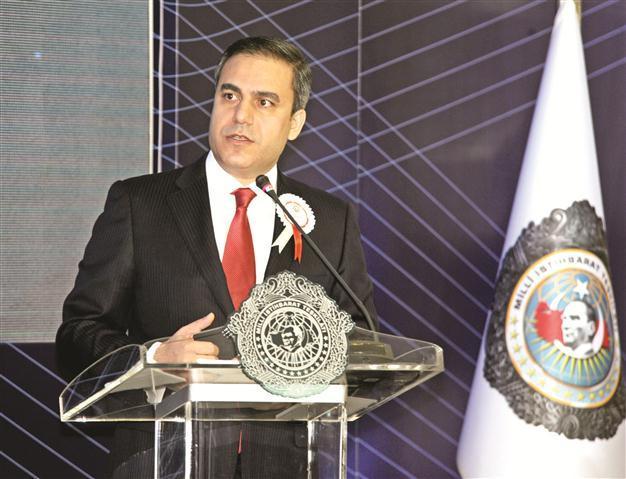Ankara in shock over probe on intel chiefs
ISTANBUL/ANKARA

National Intelligence Agency (MİT) chief Hakan Fidan is seen during a press conference at MİT headquarters. AA photo
Ankara has been left perplexed after a special-authority prosecutor summoned the National Intelligence Organization (MİT) and two retired officials for questioning over past talks with outlawed Kurdish militants in Oslo.MİT chief Hakan Fidan is the first incumbent head of the intelligence service to be summoned to answer questions in a judicial probe. Fidan, his predecessor, Emre Taner, and former MİT deputy chair Afet Güneş, who were all involved in talks with the outlawed Kurdistan Workers’ Party (PKK), were summoned Feb. 7, Istanbul’s deputy chief prosecutor Fikret Seçen told reporters.
Seçen declined to say whether the three would be questioned as witnesses, suspects, or just individuals who may possess information related to the judiciary’s wide-ranging investigation into the Kurdistan Communities Union (KCK), the PKK’s alleged urban wing. They were called by prosecutor Sadrettin Sarıkaya, who is in charge of the KCK probe in Istanbul, Seçen added.
Politicians in Ankara were surprised by the announcement, with Deputy Prime Minister Bülent Arınç expressing astonishment that they could be called to testify in the KCK probe and wondering whether Fidan could even be legally questioned.
Appointed to the head of the MİT in early 2010, Fidan made headlines in September 2011 following the release of voice recordings of a meeting between the MİT and PKK’s senior officials in Oslo. The meeting reportedly took place between late 2009 and early 2010.
PM’s permission needed
MİT’s legal bureau was studying the issue yesterday, sources said, but it was not immediately clear whether the three officials would go to the prosecutor today. Under Article 26 of the law regulating MİT, its employees can be prosecuted only with the prime minister’s permission.
Legal experts, however, said special-authority prosecutors handling terror-related probes could question anybody without permission under the penal code. The prosecutor may drop the questioning if he becomes convinced that it will lead to the exposure of state secrets. In 2009, MİT’s regional chief in Erzurum and two subordinates were arrested as part of the Ergenekon probe.
The summonses were first leaked to the media late Feb. 7 and caught Istanbul’s chief prosecutor, Turan Çolakkadı, off guard. Çolakkadı, who is supposed to be informed of such procedures, said he was unaware of the decision.
Gov’t defends MİT chief
In Ankara, senior government officials were also perplexed, with Prime Minister Recep Tayyip Erdoğan withholding any immediate comment. Erdoğan and Interior Minister İdris Naim Şahin refused to take questions from reporters.
Arınç, meanwhile, cast doubt on whether Fidan could be questioned without permission.
“I don’t know whether they will be questioned as suspects or witnesses. My mind fails to explain how those three people could be part of the KCK probe as suspects. Even if they have been summoned as suspects, I don’t think that this is possible for Fidan,” he said. Arınç speculated that the three must have been summoned as witnesses or people with information.
Foreign Minister Ahmet Davutoğlu praised Fidan and defended MİT’s contacts with the PKK, which said were conducted upon “political instructions” from the government. “We think that Fidan and his team’s work is important in the context of achieving success in the internal and external intelligence security of the state. It’s important to support this team,” Davutoğlu said.
Reaction from the opposition was mixed. Atilla Kart of the Republican People’s Party (CHP) played down the prosecutor’s move as “for show only,” while Oktay Vural of the Nationalist Movement Party (MHP) argued that Erdoğan should also be investigated for having ordered the MİT-PKK talks.
Peace and Democracy Party (BDP) deputy Altan Tan said the summoning of the MİT chief reflected the “tragicomic” stage that the KCK probe had reached.
“If you ask me, the prime minister is the number-one suspect in the KCK case,” he said tongue-in-cheek. “Let’s see how they will clean this up.”
The PKK is listed as a terrorist organization by Turkey, the United States and the European Union.
















